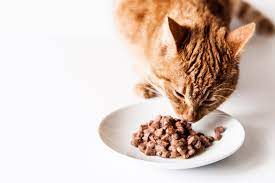The Best Cat Food for Sensitive Stomach and Vomiting
As cat owners, we want nothing but the best for our furry friends. However, many cats suffer from sensitive stomachs and vomiting, leading to distress for both the pet and the owner. According to the American Veterinary Medical Association (AVMA), gastrointestinal issues are among the most common health concerns for cats. If your feline companion is experiencing these problems, it’s crucial to find the right cat food that caters to their sensitive stomach.
In this blog post, we’ll explore the best cat foods specifically designed for cats with sensitive stomachs, discuss common problems associated with these issues, and provide expert opinions to guide you in making the best choice for your pet.

Understanding the Concept
So, what exactly constitutes a sensitive stomach in cats? A cat’s stomach may be deemed sensitive if it frequently experiences discomfort, leading to vomiting or diarrhea. This condition can be attributed to various factors, including dietary changes, food allergies, or intolerances. According to research published in the Journal of Feline Medicine and Surgery, up to 20% of cats may suffer from food allergies, resulting in gastrointestinal troubles.
Common symptoms of a sensitive stomach include:
- Frequent vomiting or regurgitation
- Diarrhea or soft stools
- Loss of appetite or sudden changes in eating habits
- Weight loss or poor coat condition
Identifying the right diet is essential for managing these symptoms and improving your cat’s overall health. Many commercial cat foods are formulated to be easily digestible and free from common allergens.
Real-World Examples
Case Study 1: Bella the Siamese
Bella, a 4-year-old Siamese cat, had been suffering from intermittent vomiting for several months. Her owner, Sarah, noticed that every time Bella ate her regular cat food, she would eventually throw it up. After a visit to the veterinarian, Sarah learned that Bella likely had a sensitivity to the grains in her food. The vet recommended switching to a grain-free formula, and after transitioning Bella to a high-quality sensitive stomach cat food, her vomiting decreased significantly.
Case Study 2: Max the Maine Coon
Max, an 8-year-old Maine Coon, experienced chronic diarrhea and occasional vomiting. His owner, Tom, was at his wit’s end trying various diets. Eventually, Tom consulted a veterinary nutritionist who suggested a limited ingredient diet. This new approach helped identify that Max was allergic to chicken, a common ingredient in many cat foods. Switching to a novel protein source like duck solved Max’s digestive issues, and he has been thriving ever since.
Benefits and Challenges
When considering cat food for sensitive stomachs, it’s essential to weigh the benefits against the challenges.
Benefits
- Easier Digestion: Foods formulated for sensitive stomachs often have prebiotics and probiotics that promote gut health.
- Reduced Allergies: Limited ingredient and hypoallergenic formulas can help manage food sensitivities and allergies.
- Improved Nutrition: High-quality ingredients can provide better nutrition and overall health for your cat.
Challenges
- Cost: Premium cat foods designed for sensitive stomachs can be more expensive than regular options.
- Transitioning Difficulties: Cats can be picky eaters, and switching their food can lead to temporary digestive upset.
- Limited Options: Not all brands offer a wide variety of flavors and formulas for sensitive stomachs.
Expert Opinions & References
Veterinary professionals emphasize the importance of selecting the right cat food for pets with sensitive stomachs. Dr. Lisa Weeth, a veterinarian and veterinary nutritionist, states that “a diet tailored to your cat’s specific needs can significantly improve their quality of life.” It’s also essential to consult your veterinarian before making any dietary changes, as they can provide personalized recommendations.
For more information on managing your cat’s dietary needs, you may refer to the PetMD article on choosing the right cat food.
FAQs
1. What ingredients should I avoid in cat food for sensitive stomachs?
Common allergens such as corn, wheat, soy, and certain proteins like chicken should be avoided if your cat has a sensitive stomach. Instead, look for foods with easily digestible proteins and limited ingredients.
2. How can I transition my cat to a new sensitive stomach food?
To transition your cat to a new diet, gradually mix the new food with the old food over 7-10 days. Start with a small amount of the new food and increase it daily while decreasing the old food. This slow transition can help minimize digestive upset.
3. Are there specific brands that are recommended for sensitive stomachs?
Several brands are well-regarded for their sensitive stomach formulas, including Hill’s Science Diet, Royal Canin, and Purina Pro Plan. Always consult with your veterinarian for personalized recommendations based on your cat’s needs.
4. Can sensitive stomachs be a sign of a more serious health issue?
Yes, chronic vomiting or diarrhea can indicate underlying health problems such as infections, parasites, or gastrointestinal diseases. If your cat’s symptoms persist, it’s crucial to seek veterinary care for a thorough examination.
Finding the best cat food for sensitive stomachs and vomiting can be a challenging yet rewarding journey. By understanding your cat’s unique needs and consulting with professionals, you can select a diet that promotes their health and happiness. Remember, what works for one cat may not work for another, so patience and observation are key. With the right approach, your feline friend can enjoy a happier, healthier life free from the discomfort of a sensitive stomach.